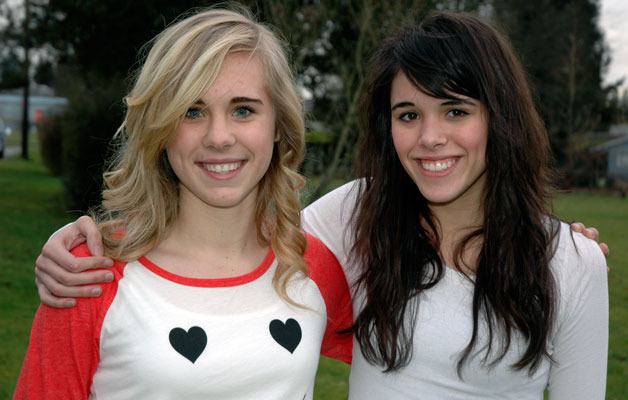LAKEWOOD — Charnie Dondrea’s first step into helping others in the community began with her concern for a close friend.
“It was really scary,” said Dondrea, the ASB president for Lakewood High School. “Ariel was missing all these days of school and all we knew was that she was at Children’s Hospital, so it obviously wasn’t just the flu. Ariel and I hang out 24-7, so not seeing her for so long was really hard.”
Dondrea was inspired to take action after she learned that Ariel Jensen, one of her best friends, was diagnosed with aplastic anemia, or bone marrow failure. To that end, Dondrea has organized a “Join the Marrow Registry” drive on Feb. 16 from 1-5 p.m. in the Cascade room of the Everett Clinic’s Medical Office Building at 1330 Rockefeller Ave. in Everett.
Ariel and her mom, Jodi Jensen, suffered an even greater scare due to Ariel’s diagnosis last fall, since aplastic anemia is so rare that doctors suspected it could be a sign of leukemia.
“We were relieved to find out that it wasn’t leukemia, but it took us three weeks to find that out,” said Ariel Jensen, who was diagnosed with aplastic anemia on Oct. 28. “It was a lot to take in at once.”
Ariel first noticed something was wrong when her cross country run times in September were slower than they’d been the year before, in spite of her having spent more time training. It was Ariel’s coach, Jeff Sowards, who eventually suggested that she get her blood checked.
“We found out it was bone marrow failure right around homecoming and her sister’s birthday,” Jodi Jensen said. “Her brother and sister were tested for a bone marrow match, because siblings have a greater transplant success rate but, unfortunately, they didn’t match.”
Ariel has undergone drug therapy, which her mother reports is going well, although the possibility of a relapse remains. Still, the Jensens and Dondrea emphasized that the “Join the Marrow Registry” drive on Feb. 16 is not for Ariel specifically, nor is it exclusively for those with aplastic anemia.
“Ariel still has thousands of potential marrow donors, but so many others have none,” Jodi Jensen said. “Hispanics, Asians and African Africans are especially in need of more donors.”
Dondrea credited her school counselor and Jodi Jensen with supplying a lot of assistance in coordinating this event, and noted that one of her own mother’s friends had the connections to help her secure the Cascade room to serve as the site of the event.
“The problems with doing this in the school included not only security, but also that the marrow registry targets older people,” Jodi Jensen said.
Dondrea had never even heard of aplastic anemia before, but seeing her friend suddenly being forced to deal with its impact made her realize that no one is immune.
“Ariel is such an outstanding athlete, so if it could happen to her, it could happen to anyone,” Dondrea said. “It’s scary to find out about this, but it’s important to build awareness about it, because it could help save lives.”
Between 600-900 people are diagnosed with aplastic anemia each year in the United States. For more information on aplastic anemia, you can log onto the Aplastic Anemia & MDS International Foundation website at www.aamds.org.
For more information on the “Join the Marrow Registry” drive on Feb. 16, call 425-422-5238. Donors may be between the ages of 18-60, but they must meet the health guidelines listed on the Puget Sound Blood Center’s website, at www.marrow.org.



